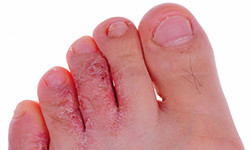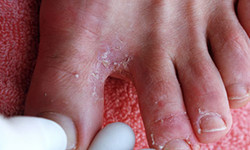Athlete’s foot is a common fungal infection that affects the skin of your feet (toes and soles). The symptoms of athlete’s foot typically include foot pain, burning, itching and scaling. Athlete’s foot, also known as tinea pedis, is a contagious infection that can spread from one person to another. If left untreated, it can spread to the palms and groin of the infected person.
Read on to find out how your dermatologist can help cure athlete’s foot.
1. Athlete’s foot causes
Most commonly, athlete’s foot is caused by a fungal growth on the feet. However, there can be other causes of this disease. Contact dermatitis, irritation from shoes and other creams, bacterial infections and skin allergies can also cause foot rashes.
2. Athlete’s foot symptoms
The symptoms of athlete’s foot indicate the growth of fungus between toes. In many cases, the symptoms are barely noticeable, as the skin feels somewhat dry and itchy. In more severe cases, the skin turns red and also begins to peel. Typically, the rash is restricted to the web of the toes and the soles of the feet.
3. Athlete’s foot treatment
Before determining the best course of treatment, your dermatologist will have to ascertain the exact cause of your foot rash—fungal or non-fungal. Your doctor may prescribe special shoe materials and absorbent socks that help your feet remain dry. White vinegar foot soaks are also recommended for this purpose.
In the case of a fungal infection, your dermatologist will recommend an anti-fungal treatment, such as miconazole, econazole nitrate, clotrimazole, terbinafine sprays and creams, and ketoconazole shampoo and cream. These topical treatments are to be administered for about a week or until the symptoms clear up. For more severe cases, the doctor will prescribe oral medication, such as terbinafine, itraconazole or fluconazole.
Non-fungal treatments require the use of topical corticosteroid creams.
Athlete’s foot is a completely curable condition. If your feet have been feeling itchier than usual, you may want to consult your dermatologist to know what treatment will work best for you.
















